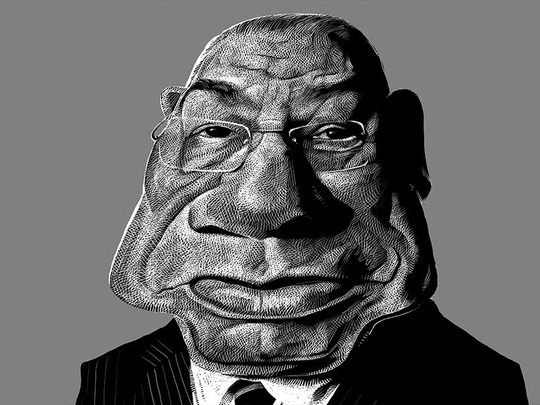
Throughout the George W. Bush administration’s first term, Colin Powell was regarded as a moderate voice on several issues, notably on Iraq. He was also one of the most popular figures in the administration internationally and among Americans.
However, the views of right-wingers such as Vice-President Dick Cheney and Deputy Defence Secretary Paul Wolfowitz more often than not won the day. As the administration expressed alarm over Baghdad’s arsenal in 2002, the secretary of state urged caution and at times seemed at odds with his cabinet colleagues.
Cheney and Rumsfeld argued for early military intervention, but Powell called for United Nations weapons inspections as a “first step”, to assess Iraq’s weapons industry.
His views in favour of involving the UN and giving Iraq “one last chance” to disarm eventually prevailed. But Powell — a retired army general — was never afraid of using force during his career.
Born Colin Luther Powell on April 5, 1937, in Harlem and raised in the South Bronx of New York to Jamaican immigrant parents, he joined the army after graduating from college and had a 35-year career as a soldier, including tours of duty in Vietnam. He has said he is still haunted by the nightmare of Vietnam and believes the war was characterised by poor leadership.
Powell was educated in the New York City public schools, and graduated from Morris High School in 1954 without any definite plans for where he wanted to go in life. It was at City College of New York, where Powell studied geology, that he found his calling in the Reserve Officers’ Training Corps (ROTC). He soon became commander of his unit. This experience set him on a military career and gave him structure and direction in his life.
After graduation in 1958, Powell was commissioned as a second lieutenant in the US Army. While stationed at Fort Devens, Massachusetts, Powell met Alma Vivian Johnson of Birmingham, Alabama, and they married in 1962. The couple now has three children: son Michael, and daughters Linda and Annemarie. That same year, he was one of 16,000 advisers sent to South Vietnam by President John F. Kennedy. In 1963, Powell was wounded by a punji-stick booby trap while patrolling the Vietnamese-Laotian border. During this first tour of duty, he was awarded a Purple Heart and, a year later, a Bronze Star.
While on his second Vietnam tour of duty from 1968 to 1969, the 31-year-old Army major was given the assignment of investigating the My Lai massacre. In this incident, more than 300 civilians were killed by US Army forces. Powell’s report seemed to refute the allegations of wrongdoing and stated, “Relations between American soldiers and the Vietnamese people are excellent.” Also during this tour in Vietnam, Powell was injured in a helicopter crash. Despite his injury, he managed to rescue his comrades from the burning helicopter, for which he was awarded the Soldier’s Medal. In all, Powell has received 11 military decorations, including the Legion of Merit.
In 1991, Powell, with General Norman Schwarzkopf, led the Gulf War coalition to victory against Iraq under George Bush senior, becoming a national hero in the US.
Powell was then chairman of the joint chiefs of staff — the highest military position in the US. He was national security adviser to President Ronald Reagan in the 1980s and supported the “Star Wars” missile programme.
Powell retired from the Army in 1993. In 1994, he joined Senator Sam Nunn and former President Jimmy Carter on a last-minute peacekeeping expedition to Haiti, which resulted in the end of military rule and a peaceful return to elected government in that country. In 1995, he published a best-selling autobiography, “My American Journey”, which chronicles his life and its influences, the ins and outs of military bureaucracy, and what he learnt in his life about personal rules and character. From 1997 to 2000, he was chairman of America’s Promise, a nonprofit organisation dedicated to fostering character and competence in young people. Powell and his wife, Alma, now co-chair the organisation, which has a presence in more than 500 communities in all 50 states.
When he became secretary of state in 2001, Powell became the highest-ranking African-American in any US administration. He said he wanted to inspire other African-Americans and seems to have succeeded, admired by many for his warmth and geniality as well as his military and political career. He was consistently the most popular cabinet member in President George W. Bush’s first term.
Powell gradually became more critical of the administration after being replaced by Condoleezza Rice following Bush’s 2004 re-election. According to the “Washington Post”, he had been asked to resign by the president’s chief of staff, Andrew Card.
Powell’s vast military experience helped shape the so-called Powell doctrine of exercising caution when sending US troops to fight abroad. Under the doctrine, troops should be sent into conflict only where there is a clear national interest and an exit strategy.
The doctrine says troops should be sent in overwhelming numbers or not at all — and only when success is assured.
Reflecting on his experiences of the Vietnam War, Powell wrote in his 1995 memoirs: “When we go to war, we should have a purpose that our people understand and support. We should mobilise the country’s resources to fulfil that mission and we should go on to win.”
Powell himself played down rumours that policy on Iraq had caused a major split in the Bush administration.
In September 2002 he told reporters: “I think there are lots of differences — some are real, some are perceived and some are over-hyped.”
The point was, he said, that the government was working hard to find a consensus.
He returned to private life after the 2004 presidential election, and became an increasingly vocal critic of the Bush administration.
Since his retirement, Powell has remained vocal on political topics. In September 2006, Powell joined moderate Senate Republicans in supporting more rights and better treatment for detainees at the Guantanamo detention facility. In October 2008, he made headlines again when he announced his endorsement of Barack Obama for president. He said Obama had “met the standard” to lead “because of his ability to inspire, because of the inclusive nature of his campaign, because he is reaching out all across America”.
Powell has also spent much of his retirement in the business community. In 2006, he was a speaker at a special series called Get Motivated, along with former New York Mayor Rudolph Giuliani. Powell also joined Kleiner Perkins Caufield & Byers, a Silicon Valley venture capital firm, as a “strategic limited partner”. He joined the board of directors at Steve Case’s new company, Revolution Health, a health-related portal site and social network that provides online tools to help people better manage their health.
Powell has spent much of his life inspiring many with his leadership skills and life experiences. Along with his wife, Powell began America’s Promise Alliance, as part of their dedication to the wellbeing of children and youth of all socioeconomic levels and their commitment to seeing that young people receive the resources necessary to succeed.
Powell began his American journey from ordinary circumstances. His close-knit family provided support and a caring environment during his childhood. He found his calling in the military, and his entire adult life has been in the service of his country. As a soldier, he was committed to protecting the nation and advancing democratic values. While he gravitated towards support roles early in his career, his organisational talent and pragmatic outlook were recognised by those who placed him in key government advisory roles.
This column aims to profile personalities who made the news once but have now faded from the spotlight.
Sourced from BBC, “Guardian”, biography.com
What he said
A dream doesn’t become reality through magic; it takes sweat, determination and hard work.
Success is the result of perfection, hard work, learning from failure, loyalty, and persistence.
Don’t let your ego get too close to your position, so that if your position gets shot down, your ego doesn’t go with it.











